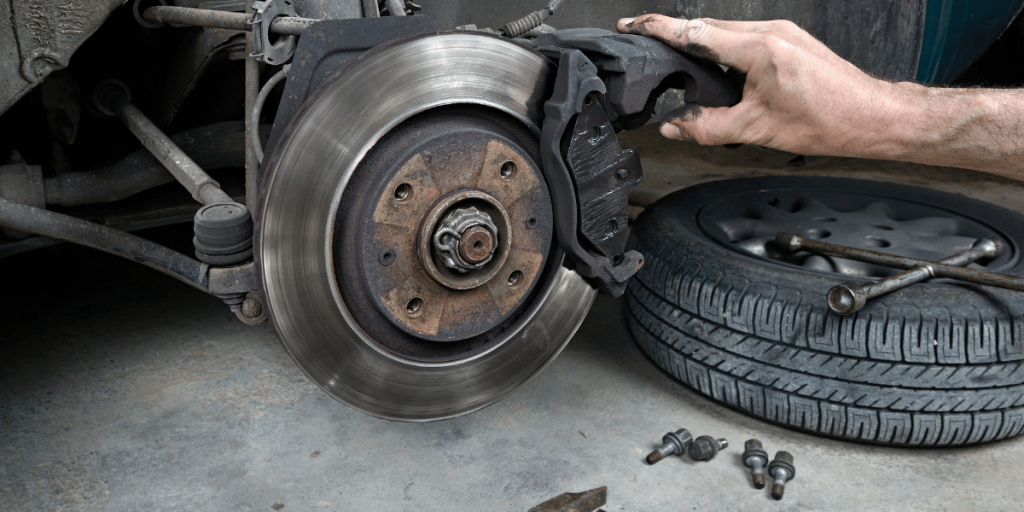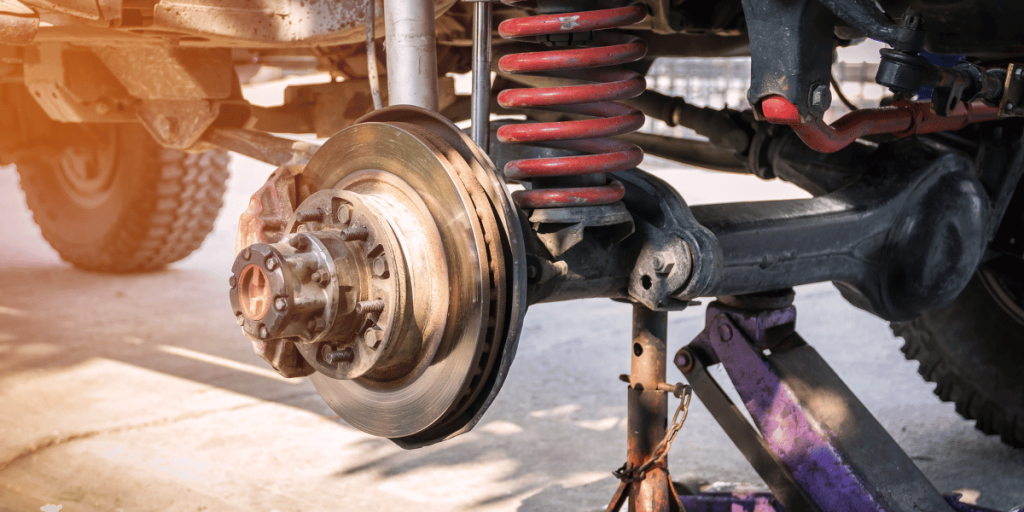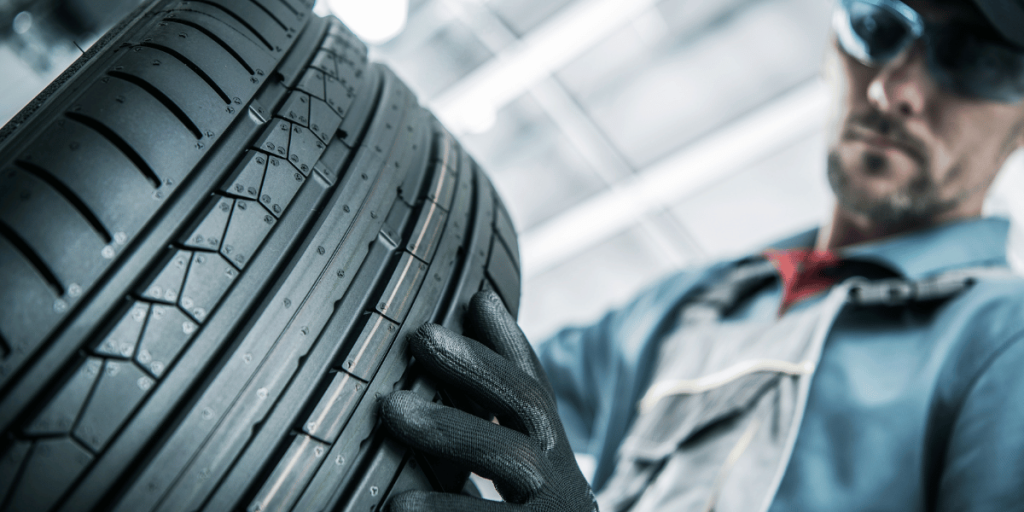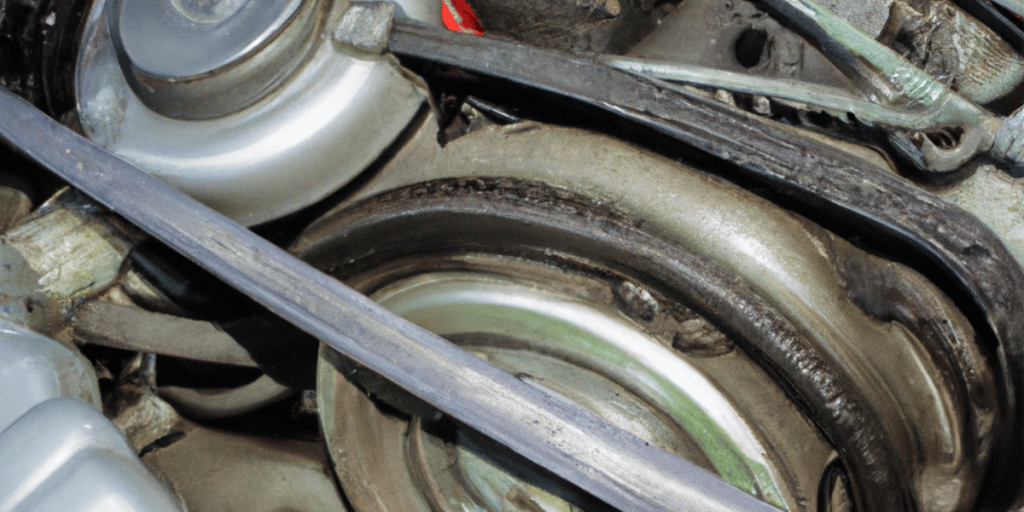All kinds of cars, old and new, often make squeaking sounds when you drive. Several things, such as old brake pads, suspension parts that aren’t working right, or even low tire pressure, can cause them. Some squeaky sounds aren’t dangerous, but others could mean there’s a bigger problem.
It’s important to know the different kinds of squeaking sounds that can happen while you’re moving so that you can tell if they mean something is seriously wrong. It’s likely that worn-out brake pads are to blame for squeaky brakes. A worn ball joint or nut can cause the suspension to make squeaking sounds. And tires that make noises like squeaking can mean that the air is too low or that the wear is not even. The best thing to do if you hear squeaking while moving is to take your car to a mechanic. They will be able to figure out what is making the noise and suggest the best way to fix it.
Different Types of Squeaking Noises While Driving
- Squeaking noises while driving but not brakes applied: This can be caused by a variety of things, including worn suspension components, low power steering fluid, worn power steering pump, worn power steering hoses, or rocks or debris in the wheel wells.
- Squeaking noises when turning: This can be caused by the same things as squeaking noises while driving but not brakes applied, as well as worn wheel bearings or worn steering rack.
- Brakes making noise while driving: This can be caused by worn brake pads, glazed rotors, or contaminated rotors.
- Squeaking noises from tires while driving: This can be caused by low tire pressure, uneven tire wear, or worn tires.

- Squeaking noises from the car: This can be caused by loose trim pieces, worn seatbelt retractors, or worn window regulators.
- Squeaking noises while driving slow: This can be caused by the same things as squeaking noises while driving at high speeds, but they may be more noticeable at low speeds because the friction is greater.
- Wheel squeaking when driving slow: This can be caused by the same things as squeaking noises while driving slow, but it is also more likely to be caused by worn wheel bearings.
- New brakes squealing while driving: New brakes may squeal for a short period of time after they are installed. This is because the new brake pads need to be seated on the rotors. After a few hundred miles, the squealing should go away.
- Squeak goes away when braking: If the squeak goes away when you brake, it is likely caused by worn brake pads. When you brake, the brake pads press against the rotors and the squealing stops.
- Brakes squeaking: Brakes may squeak for a variety of reasons, including worn brake pads, glazed rotors, or contaminated rotors.
- Squeak sound: A squeak sound can be caused by a variety of things, including squeaking brakes, squeaking suspension components, squeaking tires, squeaking trim pieces, squeaking seatbelt retractors, or squeaking window regulators.
- Brakes squeak when stopping slow: Brakes may squeak when stopping slow for the same reasons that they squeak when stopping at high speeds. However, the squeaking may be more noticeable at low speeds because the friction is greater.
- High pitched squeal from car when moving: A high pitched squeal from a car when moving can be caused by a variety of things, including squeaking brakes, slipping belts, worn wheel bearings, or damaged brakes.
- Rear wheel squeak at low speed: A rear wheel squeak at low speed can be caused by a variety of things, including worn wheel bearings, worn brake pads, glazed rotors, or contaminated rotors.
- Squeaking noise from front wheel when turning: A squeaking noise from a front wheel when turning can be caused by a variety of things, including worn ball joints, worn control arm bushings, worn wheel bearings, worn brake pads, glazed rotors, or contaminated rotors.

- Car squealing while driving at low speed: A car squealing while driving at low speed can be caused by a variety of things, including squeaking brakes, slipping belts, worn wheel bearings, or damaged brakes.
- Loud screeching noise from car while driving: A loud screeching noise from a car while driving can be caused by a variety of things, including metal on metal contact, slipping belts, or damaged brakes.
- Car squealing when driving but stops when braking: A car squealing when driving but stops when braking is likely caused by worn brake pads. When you brake, the brake pads press against the rotors and the squealing stops.
- Squeaking noise when turning steering wheel left or right: A squeaking noise when turning the steering wheel left or right can be caused by a variety of things, including worn ball joints, worn control arm bushings, worn power steering pump, worn power steering hoses, or low power steering fluid.
- Screeches: Screeches are high-pitched, ear-piercing noises. They can be caused by a variety of things, including metal on metal contact, slipping belts, worn bearings, worn tires, or loose trim pieces.

- Squeak noise: A squeak noise is a high-pitched, intermittent noise. It can be caused by a variety of things, including squeaking brakes, squeaking suspension components, squeaking tires, squeaking trim pieces, squeaking seatbelt retractors, or squeaking window regulators.
- Intermittent squealing noise while driving: An intermittent squealing noise while driving can be caused by a variety of things, including squeaking brakes, slipping belts, worn bearings, worn tires, or loose trim pieces.
- Squeaky clean meaning: Squeaky clean is a phrase that means very clean. It is often used to describe something that has been cleaned so thoroughly that it is practically sparkling.
- Car making squealing noise when driving stops when braking: A car making a squealing noise when driving that stops when braking is likely caused by worn brake pads. When you brake, the brake pads press against the rotors and the squealing stops.
- Brakes squeak when stopping: Brakes may squeak when stopping for the same reasons that they squeak when driving. However, the squeaking may be more noticeable when stopping because the friction is greater.
- Why are my brakes squealing with new brakes: New brakes may squeal for a short period of time after they are installed. This is because the new brake pads need to be seated on the rotors. After a few hundred miles, the squealing should go away.
- Grinding noise when braking but pads are fine: A grinding noise when braking but pads are fine can be caused by a variety of things, including worn brake rotors, worn brake calipers, or worn brake hardware.
- Rear suspension squeaking over bumps: Rear suspension squeaking over bumps can be caused by a variety of things, including worn ball joints, worn control arm bushings, or worn sway bar links.
- Creaking noise in rear of car: A creaking noise in the rear of the car can be caused by a variety of things, including worn suspension components, loose trim pieces, or a faulty trunk lock.
- Metal grinding sound when driving: A metal grinding sound when driving can be caused by a variety of things, including worn brake pads, worn brake rotors, worn wheel bearings, or a faulty transmission.
- Scraping noise when braking: A scraping noise when braking can be caused by a variety of things, including worn brake pads, worn brake rotors, or a loose caliper bracket.

- Wheel bearing noise: A wheel bearing noise is a low-pitched, humming noise that gets louder as you drive faster. It is caused by worn wheel bearings.
- New tires making roaring noise: New tires may make a roaring noise for a short period of time after they are installed. This is because the new tires need to be broken in. After a few hundred miles, the roaring noise should go away.
- Brake wear indicator: The brake wear indicator is a metal tab that is attached to the brake pad. When the brake pad is worn down to a certain thickness, the brake wear indicator will contact the rotor and make a squealing noise. This is a sign that it is time to replace the brake pads.
- Front suspension creaking noise: Front suspension creaking noise can be caused by a variety of things, including worn ball joints, worn control arm bushings, or worn sway bar links.
- Engine squeaking noise when idling: Engine squeaking noise when idling can be caused by a variety of things, including a loose fan belt, worn alternator pulley, or worn water pump pulley.
How to Identify the Source of the Squeaking Noise?
The best way to figure out where the noise is coming from is to record when it happens. If the noise only happens when you press the brakes, the issue is probably with the brakes. Most likely, the problem is with the suspension if the noise happens when you turn the wheel. To find the cause of the problem, it is harder if the clicking happens all the time.
As soon as you know when the squeaking starts, you can start to narrow down the reasons. For instance, if the noise only happens when you press the brakes, you can check to see if the brake pads are missing or old. If the squeaky sounds happen when you turn the wheel, check the control arms, ball joints, and bushings to see if they are outdated.
If you can’t figure out where the noise is coming from, you should take your car to a mechanic. They will be able to figure out what’s wrong and suggest the best way to fix it.
How to Fix the Squeaking Noise?
The best way to fix the noise will depend on what is making it. For instance, if the noise is coming from brake pads that are worn down, then the brake pads will need to be changed. In the event that the squeaking sound is due to worn suspension parts, then those parts will need to be changed.
You can take your car to a mechanic if you don’t feel safe fixing the noise yourself. They can fix it quickly and safely, so you can get your car back on the road.
Tips for Preventing Squeaking Noises
There are a few things you can do to stop the noise from starting in the first place:
- Have a skilled mechanic service your car on a regular basis. This will help find and fix any problems that might be happening before they start making squeaking sounds.
- Keep your tires at the right pressure. Low tire pressure can lead to a number of issues, such as squeaking sounds.
- Use brake pads and discs of good quality. This will make it less likely that your brakes will make noises.
- Regularly grease the parts that move. This will help cut down on friction and stop noises like grinding.
If you use these tips, your car will run more easily and quietly.
Thoughts on Safety
It’s important to get squeaking sounds checked out by a mechanic right away because they could mean something serious is wrong. As a driver, if you hear a squeaking sound, you should:
- If you can, pull over to a safe place.
- Check the car for damage that is easy to see, like a flat tire or a broken brake line.
- Call a mechanic or tow truck if you can’t figure out where the noise is coming from.
Keep in mind that it can be dangerous to drive with a squeaking sound. For example, if the noise is coming from brake problems, the brakes might not work at all. Is the noise coming from the suspension? If so, it could make it impossible to handle the car.
Frequently Asked Questions
Q: What should I do if I hear squeaking noises while driving?
A: If you hear squeaking noises while driving, it’s best to have your car inspected by a mechanic. They can determine the cause of the noise and recommend the necessary repairs.
Q: Are squeaking brakes always a sign of worn brake pads?
A: While worn brake pads are a common cause of squeaking brakes, other factors like glazed rotors or contaminated rotors can also lead to brake noise.
Q: Can new brakes squeal, and when will the noise go away?
A: Yes, new brakes may squeal initially as they “bed in” with the rotors. This noise should diminish after a few hundred miles of driving.
Q: Why do some squeaking noises become more pronounced at low speeds?
A: Squeaking noises are often related to friction. At lower speeds, the increased friction can make the noises more noticeable.
Q: Can I fix a squeaking noise myself?
A: It is possible to fix some squeaking noises yourself, such as squeaking brakes caused by worn brake pads. However, it is important to note that some squeaking noises can be caused by serious problems, such as worn suspension components.
Q: What should I do if I hear a squeaking noise while driving?
A: If you hear a squeaking noise while driving, the best thing to do is to have the car inspected by a qualified mechanic. The mechanic will be able to identify the source of the problem and recommend the appropriate repairs.
Q: When should I be concerned about a squeaking noise while driving?
A: You should be concerned about a squeaking noise while driving if it is:
- Loud
- Persistent
- Getting worse over time
- Accompanied by other symptoms, such as vibration, pulling, or decreased braking performance
Q: How can I identify the source of a squeaking noise while driving?
A: Paying attention to when the noise starts is the best way to figure out where it comes from while you’re moving. If the noise only happens when you press the brakes, the issue is probably with the brakes. Most likely, the problem is with the suspension if the noise happens when you turn the wheel. To find the cause of the problem, it is harder if the clicking happens all the time.
As soon as you know when the squeaking starts, you can start to narrow down the reasons. For instance, if the noise only happens when you press the brakes, you can check to see if the brake pads are missing or old. If the squeaky sounds happen when you turn the wheel, check the control arms, ball joints, and bushings to see if they are outdated.
Conclusion
There are many things that can make your car squeak while you’re driving, from small issues like worn brake pads to more serious issues like worn suspension parts or even a broken engine. Some squeaking sounds might not be dangerous, but others could mean there is a big problem. You should know the different kinds of popping sounds that can happen so you can tell if they mean something is seriously wrong. As soon as possible, you should take your car to a repair if you hear a squeaking sound before you drive. They will be able to figure out what’s wrong and suggest the best way to fix it.
